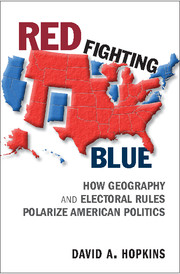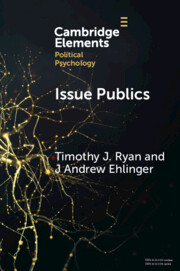Red Fighting Blue
How Geography and Electoral Rules Polarize American Politics
$27.99 ( ) USD
- Author: David A. Hopkins, Boston College, Massachusetts
- Date Published: September 2017
- availability: This ISBN is for an eBook version which is distributed on our behalf by a third party.
- format: Adobe eBook Reader
- isbn: 9781108129183
Find out more about Cambridge eBooks
$
27.99 USD
( )
Adobe eBook Reader
Other available formats:
Paperback, Hardback
Looking for an examination copy?
If you are interested in the title for your course we can consider offering an examination copy. To register your interest please contact [email protected] providing details of the course you are teaching.
-
The national electoral map has split into warring regional bastions of Republican red and Democratic blue, producing a deep and enduring partisan divide in American politics. In Red Fighting Blue, David A. Hopkins places the current partisan and electoral era in historical context, explains how the increased salience of social issues since the 1980s has redefined the parties' geographic bases of support, and reveals the critical role that American political institutions play in intermediating between the behavior of citizens and the outcome of public policy-making. The widening geographic gap in voters' partisan preferences, as magnified further by winner-take-all electoral rules, has rendered most of the nation safe territory for either Democratic or Republican candidates in both presidential and congressional elections - with significant consequences for party competition, candidate strategy, and the operation of government.
Read more- Provides a clear answer to the question of whether Americans have become regionally divided into 'red' and 'blue' states - and explains why this geographic pattern emerged over the past twenty years of American elections
- Offers new insight into the critical role that American political institutions play in intermediating between the behavior of citizens and the outcome of public policy-making
- Integrates evidence from different subject domains - including public opinion, election results, party history, and congressional studies - to provide a 'big picture' of American polarization and gridlock
Awards
- Winner, 2018 Choice Outstanding Academic Title
Reviews & endorsements
'Striking maps of ‘red’ and ‘blue’ America have become a staple of political punditry, but not a foundation for deep analysis - at least until now. In this path-breaking book, David A. Hopkins offers a powerful yet subtle account of how American electoral institutions have intensified geographic divides, and how those divides in turn shape our increasingly polarized and troubled politics. Brilliant.' Paul Pierson, University of California, Berkeley
See more reviews'Dispelling many misconceptions, David A. Hopkins shows how the geographic basis of electoral representation in the US interacts with divisions on social issues among voters to produce the enduring red and blue map. Hopkins' assessments are consistently balanced and well-informed. He offers readers a valuable guide to the politics of these not so United States. This informative, readable book reflects the measured judgment and insights of scholarship, but the author's lucid prose is accessible to undergraduates and citizens of all stripes.' David Karol, University of Maryland
'As political scientists and pundits alike have become, well, polarized over the causes and consequences of political polarization, Red Fighting Blue makes an important contribution to that debate. David A. Hopkins successfully makes the case that place matters in American politics - but not necessarily for the reasons you might think. It is not that Americans themselves are hopelessly divided, but that the very institutions of American government have led to regional voting blocs. Hopkins explains how and why that came to be the case. From now on, any discussion of polarization in American will need to reckon with the argument of Red Fighting Blue.' David Campbell, Packey J. Dee Professor of American Democracy, University of Notre Dame
'This is an accessible and informative study on the political geography of the nation, weaving together important insights on political polarization, partisan identification, and the stability of political preference. Professor Hopkins deploys credible evidence to support the contention that geographic differences in political party support have remained persistent in some places, while gaining in intensity in others. Those who want to dismiss regionalism in politics as a bygone feature of previous eras will need to grapple with the clear arguments made here.' James Gimpel, University of Maryland
‘By taking both sides of the polarization debate seriously, Hopkins successfully reconciles the compelling evidence presented by the competing perspectives.’ T. Lynch, Choice
'Red Fighting Blue is a valuable addition to the literature on American party politics and voting behaviour. Anyone interested in understanding American politics in the Twenty-first century will find David Hopkins’ analysis of the geographic underpinnings of our polarized politics to be extremely helpful.' Alan I. Abramowitz, Congress and the Presidency
Customer reviews
Not yet reviewed
Be the first to review
Review was not posted due to profanity
×Product details
- Date Published: September 2017
- format: Adobe eBook Reader
- isbn: 9781108129183
- contains: 42 b/w illus.
- availability: This ISBN is for an eBook version which is distributed on our behalf by a third party.
Table of Contents
1. A nation votes, Ohio decides
2. Solid states: the regional bases of the American parties
3. The geographic roots of party strength and cohesion
4. Mapping the cultural battlefield: how social issues fuel the regional divide
5. Regional polarization and partisan change in the US congress
6. Rural red, big-city blue, and the pivotal purple midwest
7. A locked-up nation.
Sorry, this resource is locked
Please register or sign in to request access. If you are having problems accessing these resources please email [email protected]
Register Sign in» Proceed
You are now leaving the Cambridge University Press website. Your eBook purchase and download will be completed by our partner www.ebooks.com. Please see the permission section of the www.ebooks.com catalogue page for details of the print & copy limits on our eBooks.
Continue ×Are you sure you want to delete your account?
This cannot be undone.
Thank you for your feedback which will help us improve our service.
If you requested a response, we will make sure to get back to you shortly.
×









